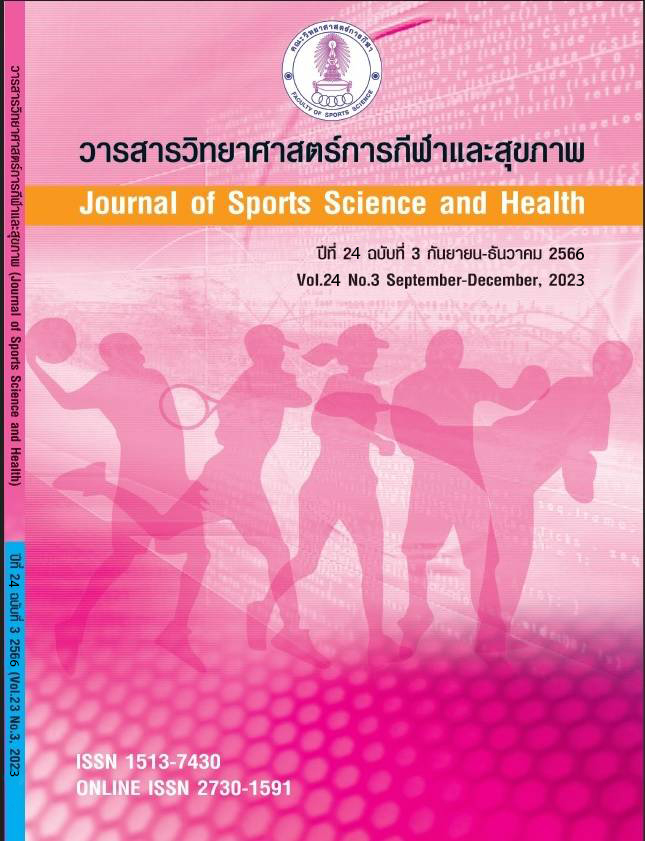GUIDELINES ON THE DEVELOPMENT OF HEALTH PROMOTION MODEL OF STUDENTS IN THAILAND NATIONAL SPORTS UNIVERSITY, TRANG CAMPUS
Main Article Content
Abstract
Purpose
This study aimed at to 1) evaluating the healthcare status of students in Thailand National Sports University Trang Campus, and 2) developing the health promotion model of students in Thailand National Sports University, Trang Campus.
Methods
Eighty students were selected by purposive sampling method from the population of 538 students in Thailand National Sports University, Trang Campus. The research instruments were the evaluation form of the respondent’s health care status, the evaluation form of the health promotion model. Moreover, the data were collected by the interview and the focus group to evaluate the effectiveness of the health promotion model. The data were analyzed using the percentage, the mean score, the standard deviation.
Results
The results found that students 62.50 percent of males and females 37.50 percent. The average age was 21-22 years old around 55 percent. Moreover, the University have adequate exercise places and sports facilities and students also have knowledge about exercising at a good level. On eat and clean water to drink when they eat, they use serving spoons. Moreover, they have a good knowledge about consuming fruit and vegetables, smoking and drinking alcohol at a good level.
Conclusion
In summary, knowledge should be given about the formats of activities to promote exercise. reduce food consumption, quit smoking and drinking alcohol in a type variety that optimum to the student needs significantly. For this reason, university administrators should encourage students, related people and advisors to organize activities by collaborative student leadership organizations at all levels, such as majors, clubs, faculties, and student clubs at each campus and university. This may result in students continuing to have behaviors that good and sustainable health care.
Article Details

This work is licensed under a Creative Commons Attribution-NonCommercial-NoDerivatives 4.0 International License.
References
Aparat Ingkhapakorn. (2014). Knowledge, Attitudes and Smoking Behaviors among Male Undergraduate Students, Kasetsart University, Bangkhen Campus. Bangkok. Bachelor of Education, Health Education, Faculty of Education, Kasetsart University.
Chatsakorn Kongcheewasakul., et al. (2014). Exercise Behavior for Health of Rajamangala Srivijaya University Students, Songkhla Campus. Master Thesis. Thaksin University.
Dhanes Tuancha-em, et al. (2011). Institute of Thailand National Development Researchers Handbook. Bangkok. N.P.
Donruedee Suwankiri. (2007). 8 Happiness Points in Work Place. Bangkok: Thai Health Publication.
Good. (2011). The Processes and Models Promoting the Health Implementation of Administrative Organizations. Bangkok: Google. (Online) From: www.thaihed.com/dbweb/download
Jariyawat Khompayak. (2006). Factors Related to Health Promoting Behaviors of the Families in the Community, Khlong Maha Nak, Pom Prap, Sattru Phai District, Bangkok. (Online) From: http://www.academic.hcu.ac.th/forum/board_posts.asp?FID=27&UID
Kamtorn Pramsopee. (2016). Physical and Mental Health. [Online]. From http://www.snr.ac.th/elearning/kamtorn/section3.6.htm.
Kesara Chaonahuaytako and Jarapan Chuencharoen. (2007). Health Promoting Behaviors of People, Mueang District, Nakhon Pathom Province. (Online). From http://ps.npru.ac.th/health
Kran Panyo. (2012). Aerobic Exercise. Chiang Mai. Department of Health and Wellness Promotion. Faculty of Education, Chiang Mai University.
Niyom Channuan., and Palakorn Suebsamran. (2016). Smoking Situations of Employees and Students of Ubon Ratchatani. (Online) From: https://www.google.co.th/
Potchanan Niramitichaiyanon., Jitsuda Limkriagkrai., and Direk Manmana. (2012). Happiness and Satisfaction in Human Resources Management in Organizational Culture. Mahidol University, Faculty of Social Sciences and Humanities.
Rattanawadee Na Nakhon. (2008). Physiology of Exercise. Khon Kaen. Department of Internal Medicine. Faculty of Medicine, Khon Kaen University.
Rujira Duangsong. (2007). Health Management and Health Promotion. Khon Kaen. KKU Printing.
Somnuek Kaewwilai (2010). Factors Affecting Exercise Behavior of Undergraduate Student in Rajamangala University of Technology Phra Nakhon. Bangkok: Faculty of Business Administration. Rajamangala University of Technology Phra Nakhon.
Siripaisarn Yimprasert. (2017). Food Consumption Behavior of Undergraduate Students Level 1in Rajamangala University of Technology Isan Nakhon Ratchasima. (Online) From: https://www.tci-thaijo.org/index.php/Ratchaphruekjournal/article/download/90783/71262
Sureerat Rongruang., and Somkiat Suknuntapong. (2011). Health Promotion Behavior of Students in Prince of Songkla University, Pattani Campus. Pattani: Prince of Songkla University.
Yamana.Taro (1967). Statics, An Introductory Analysis, 2nd Ed., New York: Harper and Row.


